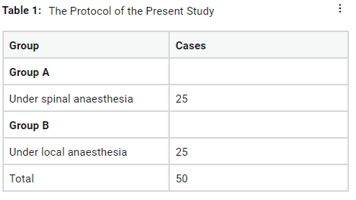Abstract
Multiple researchers have given numerous guidelines in the clinical management of this disorder in the late nineteenth and twentieth centuries, after comprehensive works on the subject. As a result, a very wide variety of surgical procedures are now available to the surgeon to suit the requirement. There have been numerous advances in the management of inguinal hernia. Inguinal hernias can conveniently be repaired under all kinds of anaesthesia, namely general, spinal and local. Whereas the general anaesthesia requires the services of an experienced anaesthetist and new devices and spinal anaesthesia requires postoperative impairment while local anaesthesia is safe to prescribe, easy and efficient and does not cause postoperative complications. This work consisted of a study group of twenty-five adult patients of uncomplicated inguinal hernias, who after repair of hernias, which after repair of hernias were allowed early ambulation and had a short hospital, stay of one day post operatively. The second control group consisted of similar twenty-five patients who are subjected to conventional delayed ambulation and prolonged hospital stay. The results of repair in the two groups were compared; the available literature on the subject was reviewed. The implementation of ”short stay surgery” not only relieves the waiting list in hospitals but also offers an economic boost and provides the patient with some social advantages.
Full text article
Authors

This work is licensed under a Creative Commons Attribution-NonCommercial-NoDerivatives 4.0 International License.

